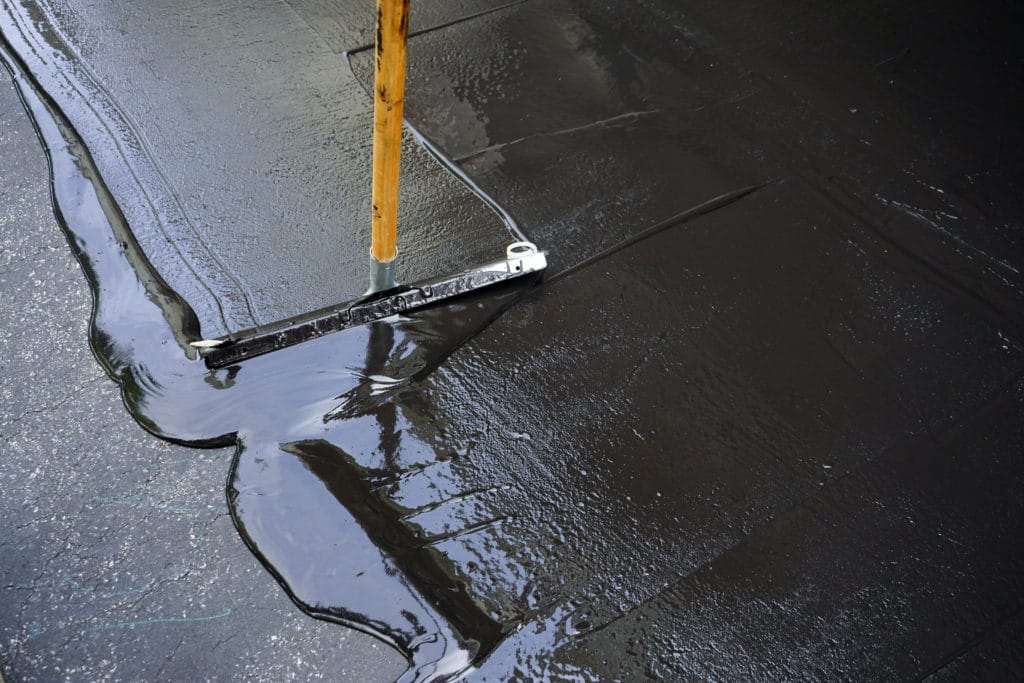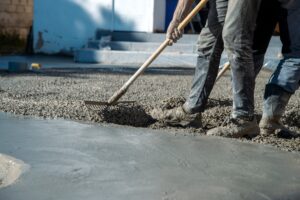Let’s face it, the condition of your driveway probably isn’t something you think about daily—unless it’s already showing signs of wear. But the key to keeping your asphalt in top shape is taking action before cracks and damage set in.
Sealing your driveway is a pretty basic and inexpensive way to protect it from weather and wear and tear. You will be grateful not only to see a newly sealed surface—smooth and black—but you’ll be able to cut costs afterward, if you can avoid pricey repairs.
Probably one of the most frequently asked questions we get, pertaining to asphalt seal coating, is: how often should you seal coat your driveway? But the fact remains, there is no one-size-fits-all answer. That’s why we have put together this driveway sealing guide to help you decide if your driveway could use a refresh.
What Causes Asphalt to Break Down?
Asphalt driveways last a long time, but not forever. Environment, traffic, and maintenance determine just how quickly asphalt can break down.
Climatic Effects
The single biggest factor in how your pavement will fare over time is the environment surrounding it. Sunlight, precipitation, humidity, and temperature changes all take their toll on your driveway’s asphalt.
Asphalt is the binder that glues together the sand particles and gravel making up your driveway. When exposed to UV rays from the sun this asphalt binder material oxidizes, causing it to become brittle. Brittle pavement is highly susceptible to small surface cracks. Once a surface is cracked, even a little bit, water is able to enter and break down the asphalt further – either by freezing or washing the sand and gravel base away.
Traffic Factors
I’m willing to bet that your driveway sees less traffic than the average city road, but that doesn’t make it less susceptible to damage. Driveways are not paved with the same specifications as roadways and parking lots. Asphalt driveways are often built with a lower grade material than community roads that are meant to withstand constant traffic and abuse. Additionally, roadways are paved with three inches of asphalt that sits on top of 6 inches of compacted asphalt base, giving it a strong foundation. A typical driveway has a lesser asphalt to base ratio when constructed.
Parking on your driveway, driving vehicles over it, and even children playing on it contribute to its breakdown and aging.
How Does Asphalt Sealcoating Work?
Seal coat, also known as asphalt sealer, or asphalt sealant, is a protective layer of asphalt emulsion material that’s applied to an asphalt surface to maintain its body and slow structural breakdown and raveling.
Seal Coating Application
Asphalt driveway sealant can be applied in a few ways, either with a spray technique or spread with a squeegee. Only 1-2 coats of sealer are needed. Once applied, the asphalt coating begins curing, a process that can take up to 24 hours. After the driveway sealer cures completely, you will be left with a smooth, attractive driveway coating that can be driven on as usual.
Read More: How Long Does Sealcoat Take to Dry?
Seal Coating Benefits
You can think of seal coat as a roof over your driveway. Sealing a driveway prevents moisture and UV rays from hitting the asphalt and compromising its integrity. The sealant also acts as a barrier to oil stains and gasoline that may leak onto the surface of your asphalt pavement, speeding up its breakdown.
Additionally, asphalt sealing creates a “flexible” surface that doesn’t become as brittle or crack under pressure.
Assessing Your Driveway’s Pavement
Knowing when to seal coat driveway asphalt has less to do with time and everything to do with its condition. Here are a few signs to look for when determining if it’s time to reseal your driveway.
1. You can see exposed pavement:
Seal coating your driveway isn’t a permanent, one-time solution. A sealed driveway has a thin protective layer of coating on top of your blacktop, that will eventually wear away. Once your seal coat has worn down to the point that you can see the exposed stones of the pavement below, it’s time to reseal your driveway.
2. You’ve noticed some small cracks:
Seal coat can not be applied over large cracks and imperfections. However, applying it over small cracks helps put off the need for crack sealing and repairs. If you’re starting to notice small, hairline cracks in your driveway a fresh seal coat can prolong the deterioration, and the need for driveway repair, saving you money in the long run.
However, if you notice larger cracks or damaged asphalt, these will need to be repaired or specially sealed before you can apply asphalt driveway sealer effectively.
Read More: When to Seal vs Repair Cracked Asphalt
3. Your driveway just had its first birthday:
Brand new asphalt driveways should not be seal coated – yet. Fresh asphalt contains oils that evaporate away as it ages. After a year, the oils will have evaporated completely, leaving the driveway completely hardened. If driveway seal coating is applied to a new asphalt driveway before this point, the asphalt may permanently be too soft. Wait to seal new driveway asphalt.
Read More: When to Seal New Asphalt (And Why You Must Wait)
4. It’s been more than three years since you last seal coated:
In most cases, relatively new asphalt driveways should be resealed at least every three years. Waiting longer for driveway sealcoating means risking cracks, damage, potholes, and more costly asphalt repair. Doing it too frequently can lead to peeling and cracking.
Need Asphalt Seal Coating in Utah?
If you’re unsure about where the condition of your pavement stands, let us take a look at it for you! Superior Asphalt, LC’s team of professional estimators can assess your pavement and help you determine a proper asphalt maintenance schedule consistent with the needs of your driveway. Learn more about our sealcoating services in Utah or request a quote online now.
Related Articles:




